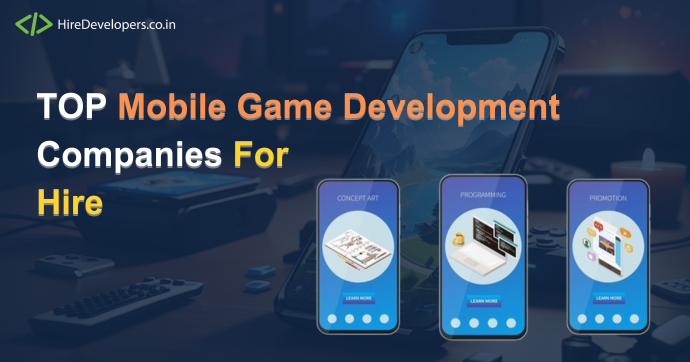December 1, 2024
Author: admin
Top Mobile Game Development Companies for Hire: Elevate Your Game with Expert Talent

The gaming industry is booming more than ever, with millions of mobile games launched yearly. Hiring the right team is essential for entrepreneurs and gaming enthusiasts looking to create a successful mobile game. With the right mobile game development company, you gain access to specialized knowledge, advanced technology, and a team dedicated to transforming your vision into an engaging, high-performing game. This article will help you understand what to look for when hiring mobile app development companies and highlight some of the top companies in the field.
Why Choose a Mobile Game Development Company?
Creating a mobile game requires more than just an idea—it requires coding skills, graphic design, user interface development, and in-depth testing to ensure a smooth, glitch-free experience for users. Mobile game development companies bring a range of expert skills and resources, allowing you to focus on your game’s concept while professionals handle the technical details. Here’s why choosing the right company is crucial:
- Expertise and Experience: Game development companies have seasoned developers and designers who know what works in the market. They bring years of experience, which helps them tackle challenges and deliver high-quality results.
- Access to Advanced Tools: Reputable companies use state-of-the-art tools and software, allowing them to create optimized, visually appealing, and high-performance games.
- Cost-Effective Solutions: Hiring a professional game development company can often save you money in the long run by avoiding costly mistakes and ensuring timely project delivery.
Also read: 11 Angular Developer Capabilities For Optimizing Web Application Development
Top Mobile Game Development Companies to Consider
Finding the best mobile game developers for hire can be a game-changer for your project. Here are some of the top-rated companies in the industry that can help bring your vision to life:
1. Hire Developers
If you’re looking for a flexible and reliable company with skilled developers, hire developers is a fantastic choice. Known for their wide expertise in mobile app development companies and ability to adapt to various project requirements, they offer personalized solutions for game development. Their team has worked on various gaming genres, and they provide end-to-end services from concept to launch, making the development process smooth and efficient.
2. Cubix
Cubix has a proven track record of creating innovative mobile games. They specialize in game development, augmented reality (AR), and virtual reality (VR) games. With expertise in advanced technologies, Cubix offers scalable and high-performance solutions for mobile game development. Their team is well-versed in designing unique gaming experiences that attract and retain players, making them one of the most sought-after companies for mobile game development.
3. Hyperlink InfoSystem
Hyperlink InfoSystem is a trusted name in the app development industry, known for its extensive portfolio and high-quality services. They offer full-cycle game development services, including design, coding, and testing. With a focus on customer satisfaction, Hyperlink InfoSystem ensures that all projects are completed within deadlines and meet quality standards. They have developed a wide range of mobile games, from simple to highly interactive ones, and are known for their professionalism and client-focused approach.
4. INORU
INORU specializes in high-end mobile games, offering expertise in creating dynamic and engaging gaming experiences. They focus on delivering premium-quality games across multiple platforms, ensuring the best performance and graphics for a wide range of devices. INORU’s team of developers brings a wealth of experience and offers customization options to meet your specific game requirements. They have a strong reputation for delivering complex projects on time, making them a reliable choice for ambitious game projects.
5. Quytech
Quytech has a solid reputation in mobile game development, with experience across genres like sports, action, adventure, and educational games. They are known for creating visually stunning games with immersive gameplay. Quytech’s developers stay updated with the latest trends and technologies, ensuring your game has the latest features and best practices. They also offer transparent communication throughout the development process, making them a great choice for businesses looking for close collaboration.
6. Red Apple Technologies
Red Apple Technologies specializes in AR/VR, 2D and 3D games, and other immersive experiences. They have a skilled team of developers and designers who create user-centered games that deliver high engagement and performance. Red Apple Technologies stands out for their creativity and ability to deliver visually stunning graphics, making them an ideal choice for companies aiming for a high-end gaming experience.
Benefits of Hiring Expert Mobile Game Developers
Working with expert game developers brings a host of benefits that can set your game up for success:
- Quality Assurance: hire expert developer to ensure that your game is bug-free and optimized for a seamless user experience.
- Time Efficiency: Professional teams have efficient workflows and established processes, which help in delivering projects on time without compromising quality.
- Customization and Flexibility: Experts can provide tailored solutions based on your game’s unique requirements, making sure it stands out in a crowded marketplace.
- Innovation and Creativity: Experienced developers understand the latest gaming trends and can incorporate innovative features to make your game more appealing to users.
Read More-: Benefits of Hiring Software Developers From India
How to Begin the Hiring Process?
- Define Your Game’s Scope: Determine the game’s genre, features, and complexity. Having a clear vision will help in communicating your requirements effectively to potential developers.
- Shortlist and Contact Companies: Based on your research, make a list of potential game development companies that align with your project needs and budget.
- Request a Proposal: Ask for a proposal that includes an estimated timeline, cost, and development strategy.
- Evaluate the Proposal: Review the proposal carefully, considering the company’s expertise, communication style, and post-launch support options. This is a crucial step to ensure that the team you hire aligns with your goals.
- Begin Development and Stay Involved: Once you’ve selected a company, maintain regular communication with the team, providing feedback at every stage to ensure your vision is realized.
Conclusion
Finding the right mobile game development company can be the difference between a game that fades quickly and one that captivates users worldwide. With experts in the field, you can bring your game concept to life in a way that resonates with players, ensuring a smooth, fun experience that keeps them coming back. Take the time to research, plan, and choose a development partner who understands your vision and has the expertise to make it happen. Whether you’re looking to develop a simple casual game or a complex AR experience, the right team is out there, ready to help you make your mark in the mobile gaming world.
Related Articles-:






